7 Market Research Screening Best Practices using AI
7 Market Research Screening Best Practices using AI
7 Market Research Screening Best Practices using AI



Market research agencies must adopt screening surveys best practices to ensure accurate, relevant data collection aligned with client needs. Following these practices enhances efficiency in resource utilization, improves data quality, and fosters client satisfaction by delivering actionable insights. Ethical compliance and regulatory standards are maintained, reinforcing credibility and trust. Ultimately, adherence to best practices differentiates agencies in a competitive market, positioning them to consistently provide high-quality research outcomes that drive strategic decision-making and business success.
This blog delves into seven witty yet professional best practices for leveraging AI in screening surveys, enhancing precision and efficiency in gathering insights that matter.
1. Embrace Dynamic Criteria Adjustments
Gone are the days of rigid screening criteria etched in stone. AI empowers researchers to dynamically adjust criteria based on real-time data insights. This agility ensures that screening parameters stay relevant and responsive to evolving market trends and participant profiles. Imagine a survey that recalibrates its criteria on the fly—now that’s smart screening!
2. Personalize Participant Engagement
AI doesn’t just crunch numbers; it understands people. By personalizing participant interactions, AI-driven screening surveys can tailor questions and content to match individual preferences and behaviors. This not only boosts engagement but also elicits richer, more nuanced responses. Think of it as having a virtual research assistant who knows exactly how to keep respondents hooked.
3. Harness the Power of Predictive Analytics
Predictive analytics isn’t just for sports stats—it’s a game-changer in screening surveys too. AI algorithms analyze past participant behavior to predict future trends and preferences. This foresight enables researchers to identify and invite participants who are not only eligible but also likely to provide valuable insights. It’s like having a crystal ball for your survey recruitment!
4. Automate, Automate, Automate
Say goodbye to manual screening woes. AI automates the grunt work of participant qualification, freeing up researchers to focus on strategy and analysis. Automated processes handle large volumes of data swiftly and accurately, ensuring that qualified participants are identified in record time. Efficiency has a new avatar, and it’s AI-powered.
5. Ensure Ethical and Bias-Free Screening
AI is a stickler for fairness. By eliminating human biases, AI-driven screening surveys uphold ethical standards and ensure equitable participant selection. This impartial approach not only enhances the credibility of research findings but also fosters trust among participants. Fair play and accurate data go hand in hand—thanks to AI.
6. Optimize Survey Flow with Smart Skip Logic
Ever been annoyed by irrelevant survey questions? AI understands. Smart skip logic directs participants to relevant questions based on their responses, creating a seamless survey experience. This not only reduces respondent fatigue but also maximizes data quality by focusing on what truly matters. It’s like taking the scenic route without the unnecessary detours.
7. Iterate and Innovate with Real-Time Feedback
Continuous improvement is the name of the game in AI-driven screening surveys. Real-time feedback loops allow researchers to tweak and refine survey questions on the go. This iterative process ensures that screening surveys remain effective and aligned with research goals. Adaptability meets innovation—powered by AI.
Why Market Research Agencies Should Conduct Screening Surveys
Market research agencies rely on screening surveys to ensure the quality and relevance of the data they collect. Adhering to best practices in screening surveys is crucial for several reasons:
Accuracy and Reliability: Properly designed screening surveys help agencies identify and recruit participants who fit specific criteria essential to the research objectives. This ensures that the data collected is accurate, reliable, and truly reflective of the target population.
Relevance of Insights: By screening participants effectively, agencies can gather insights that are directly relevant to their clients' needs and business goals. This targeted approach enhances the usefulness of the research findings for making informed decisions.
Efficiency in Resource Utilization: Best practices in screening surveys optimize the use of resources, including time and budget. By efficiently identifying qualified participants, agencies can minimize wasted effort on gathering data from unqualified respondents.
Enhanced Data Quality: Well-designed screening surveys reduce the risk of bias and inaccuracies in participant selection. This leads to higher-quality data that is more likely to provide meaningful insights and support robust analysis.
Client Satisfaction: Clients rely on market research agencies to deliver actionable insights that drive strategic decisions. Adhering to best practices in screening surveys enhances the credibility and reliability of the research outcomes, fostering client satisfaction and trust.
Compliance and Ethical Standards: Following best practices ensures that screening surveys adhere to ethical guidelines and regulatory requirements. This includes protecting participant privacy, maintaining confidentiality, and conducting research in an ethical manner.
Competitive Advantage: Agencies that consistently apply best practices in screening surveys differentiate themselves in the competitive market research landscape. They are better positioned to attract and retain clients by demonstrating expertise, reliability, and the ability to deliver high-quality research outcomes.
In essence, adherence to screening surveys best practices enables market research agencies to uphold standards of excellence, optimize research outcomes, and meet client expectations effectively. It forms the foundation for conducting meaningful and impactful research that drives business success in a dynamic and competitive environment.
Conclusion: Unleashing the Potential of AI in Market Research
AI is a transformative force in market research screening. By embracing these seven best practices, researchers can harness AI’s capabilities to streamline participant selection, enhance data quality, and derive actionable insights with unprecedented precision.
Stay ahead of the curve, embrace AI-native survey builders like Metaforms for more practical, actionable insights. They leverage advanced Artificial Intelligence capabilities like Natural Language Processing (NLP) to conduct market research surveys from start to finish and beyond in a more cost-effective way while ensuring reliable data analytics and deeper actionable insights. Sign-up with Metaforms.ai today!
Market research agencies must adopt screening surveys best practices to ensure accurate, relevant data collection aligned with client needs. Following these practices enhances efficiency in resource utilization, improves data quality, and fosters client satisfaction by delivering actionable insights. Ethical compliance and regulatory standards are maintained, reinforcing credibility and trust. Ultimately, adherence to best practices differentiates agencies in a competitive market, positioning them to consistently provide high-quality research outcomes that drive strategic decision-making and business success.
This blog delves into seven witty yet professional best practices for leveraging AI in screening surveys, enhancing precision and efficiency in gathering insights that matter.
1. Embrace Dynamic Criteria Adjustments
Gone are the days of rigid screening criteria etched in stone. AI empowers researchers to dynamically adjust criteria based on real-time data insights. This agility ensures that screening parameters stay relevant and responsive to evolving market trends and participant profiles. Imagine a survey that recalibrates its criteria on the fly—now that’s smart screening!
2. Personalize Participant Engagement
AI doesn’t just crunch numbers; it understands people. By personalizing participant interactions, AI-driven screening surveys can tailor questions and content to match individual preferences and behaviors. This not only boosts engagement but also elicits richer, more nuanced responses. Think of it as having a virtual research assistant who knows exactly how to keep respondents hooked.
3. Harness the Power of Predictive Analytics
Predictive analytics isn’t just for sports stats—it’s a game-changer in screening surveys too. AI algorithms analyze past participant behavior to predict future trends and preferences. This foresight enables researchers to identify and invite participants who are not only eligible but also likely to provide valuable insights. It’s like having a crystal ball for your survey recruitment!
4. Automate, Automate, Automate
Say goodbye to manual screening woes. AI automates the grunt work of participant qualification, freeing up researchers to focus on strategy and analysis. Automated processes handle large volumes of data swiftly and accurately, ensuring that qualified participants are identified in record time. Efficiency has a new avatar, and it’s AI-powered.
5. Ensure Ethical and Bias-Free Screening
AI is a stickler for fairness. By eliminating human biases, AI-driven screening surveys uphold ethical standards and ensure equitable participant selection. This impartial approach not only enhances the credibility of research findings but also fosters trust among participants. Fair play and accurate data go hand in hand—thanks to AI.
6. Optimize Survey Flow with Smart Skip Logic
Ever been annoyed by irrelevant survey questions? AI understands. Smart skip logic directs participants to relevant questions based on their responses, creating a seamless survey experience. This not only reduces respondent fatigue but also maximizes data quality by focusing on what truly matters. It’s like taking the scenic route without the unnecessary detours.
7. Iterate and Innovate with Real-Time Feedback
Continuous improvement is the name of the game in AI-driven screening surveys. Real-time feedback loops allow researchers to tweak and refine survey questions on the go. This iterative process ensures that screening surveys remain effective and aligned with research goals. Adaptability meets innovation—powered by AI.
Why Market Research Agencies Should Conduct Screening Surveys
Market research agencies rely on screening surveys to ensure the quality and relevance of the data they collect. Adhering to best practices in screening surveys is crucial for several reasons:
Accuracy and Reliability: Properly designed screening surveys help agencies identify and recruit participants who fit specific criteria essential to the research objectives. This ensures that the data collected is accurate, reliable, and truly reflective of the target population.
Relevance of Insights: By screening participants effectively, agencies can gather insights that are directly relevant to their clients' needs and business goals. This targeted approach enhances the usefulness of the research findings for making informed decisions.
Efficiency in Resource Utilization: Best practices in screening surveys optimize the use of resources, including time and budget. By efficiently identifying qualified participants, agencies can minimize wasted effort on gathering data from unqualified respondents.
Enhanced Data Quality: Well-designed screening surveys reduce the risk of bias and inaccuracies in participant selection. This leads to higher-quality data that is more likely to provide meaningful insights and support robust analysis.
Client Satisfaction: Clients rely on market research agencies to deliver actionable insights that drive strategic decisions. Adhering to best practices in screening surveys enhances the credibility and reliability of the research outcomes, fostering client satisfaction and trust.
Compliance and Ethical Standards: Following best practices ensures that screening surveys adhere to ethical guidelines and regulatory requirements. This includes protecting participant privacy, maintaining confidentiality, and conducting research in an ethical manner.
Competitive Advantage: Agencies that consistently apply best practices in screening surveys differentiate themselves in the competitive market research landscape. They are better positioned to attract and retain clients by demonstrating expertise, reliability, and the ability to deliver high-quality research outcomes.
In essence, adherence to screening surveys best practices enables market research agencies to uphold standards of excellence, optimize research outcomes, and meet client expectations effectively. It forms the foundation for conducting meaningful and impactful research that drives business success in a dynamic and competitive environment.
Conclusion: Unleashing the Potential of AI in Market Research
AI is a transformative force in market research screening. By embracing these seven best practices, researchers can harness AI’s capabilities to streamline participant selection, enhance data quality, and derive actionable insights with unprecedented precision.
Stay ahead of the curve, embrace AI-native survey builders like Metaforms for more practical, actionable insights. They leverage advanced Artificial Intelligence capabilities like Natural Language Processing (NLP) to conduct market research surveys from start to finish and beyond in a more cost-effective way while ensuring reliable data analytics and deeper actionable insights. Sign-up with Metaforms.ai today!
Market research agencies must adopt screening surveys best practices to ensure accurate, relevant data collection aligned with client needs. Following these practices enhances efficiency in resource utilization, improves data quality, and fosters client satisfaction by delivering actionable insights. Ethical compliance and regulatory standards are maintained, reinforcing credibility and trust. Ultimately, adherence to best practices differentiates agencies in a competitive market, positioning them to consistently provide high-quality research outcomes that drive strategic decision-making and business success.
This blog delves into seven witty yet professional best practices for leveraging AI in screening surveys, enhancing precision and efficiency in gathering insights that matter.
1. Embrace Dynamic Criteria Adjustments
Gone are the days of rigid screening criteria etched in stone. AI empowers researchers to dynamically adjust criteria based on real-time data insights. This agility ensures that screening parameters stay relevant and responsive to evolving market trends and participant profiles. Imagine a survey that recalibrates its criteria on the fly—now that’s smart screening!
2. Personalize Participant Engagement
AI doesn’t just crunch numbers; it understands people. By personalizing participant interactions, AI-driven screening surveys can tailor questions and content to match individual preferences and behaviors. This not only boosts engagement but also elicits richer, more nuanced responses. Think of it as having a virtual research assistant who knows exactly how to keep respondents hooked.
3. Harness the Power of Predictive Analytics
Predictive analytics isn’t just for sports stats—it’s a game-changer in screening surveys too. AI algorithms analyze past participant behavior to predict future trends and preferences. This foresight enables researchers to identify and invite participants who are not only eligible but also likely to provide valuable insights. It’s like having a crystal ball for your survey recruitment!
4. Automate, Automate, Automate
Say goodbye to manual screening woes. AI automates the grunt work of participant qualification, freeing up researchers to focus on strategy and analysis. Automated processes handle large volumes of data swiftly and accurately, ensuring that qualified participants are identified in record time. Efficiency has a new avatar, and it’s AI-powered.
5. Ensure Ethical and Bias-Free Screening
AI is a stickler for fairness. By eliminating human biases, AI-driven screening surveys uphold ethical standards and ensure equitable participant selection. This impartial approach not only enhances the credibility of research findings but also fosters trust among participants. Fair play and accurate data go hand in hand—thanks to AI.
6. Optimize Survey Flow with Smart Skip Logic
Ever been annoyed by irrelevant survey questions? AI understands. Smart skip logic directs participants to relevant questions based on their responses, creating a seamless survey experience. This not only reduces respondent fatigue but also maximizes data quality by focusing on what truly matters. It’s like taking the scenic route without the unnecessary detours.
7. Iterate and Innovate with Real-Time Feedback
Continuous improvement is the name of the game in AI-driven screening surveys. Real-time feedback loops allow researchers to tweak and refine survey questions on the go. This iterative process ensures that screening surveys remain effective and aligned with research goals. Adaptability meets innovation—powered by AI.
Why Market Research Agencies Should Conduct Screening Surveys
Market research agencies rely on screening surveys to ensure the quality and relevance of the data they collect. Adhering to best practices in screening surveys is crucial for several reasons:
Accuracy and Reliability: Properly designed screening surveys help agencies identify and recruit participants who fit specific criteria essential to the research objectives. This ensures that the data collected is accurate, reliable, and truly reflective of the target population.
Relevance of Insights: By screening participants effectively, agencies can gather insights that are directly relevant to their clients' needs and business goals. This targeted approach enhances the usefulness of the research findings for making informed decisions.
Efficiency in Resource Utilization: Best practices in screening surveys optimize the use of resources, including time and budget. By efficiently identifying qualified participants, agencies can minimize wasted effort on gathering data from unqualified respondents.
Enhanced Data Quality: Well-designed screening surveys reduce the risk of bias and inaccuracies in participant selection. This leads to higher-quality data that is more likely to provide meaningful insights and support robust analysis.
Client Satisfaction: Clients rely on market research agencies to deliver actionable insights that drive strategic decisions. Adhering to best practices in screening surveys enhances the credibility and reliability of the research outcomes, fostering client satisfaction and trust.
Compliance and Ethical Standards: Following best practices ensures that screening surveys adhere to ethical guidelines and regulatory requirements. This includes protecting participant privacy, maintaining confidentiality, and conducting research in an ethical manner.
Competitive Advantage: Agencies that consistently apply best practices in screening surveys differentiate themselves in the competitive market research landscape. They are better positioned to attract and retain clients by demonstrating expertise, reliability, and the ability to deliver high-quality research outcomes.
In essence, adherence to screening surveys best practices enables market research agencies to uphold standards of excellence, optimize research outcomes, and meet client expectations effectively. It forms the foundation for conducting meaningful and impactful research that drives business success in a dynamic and competitive environment.
Conclusion: Unleashing the Potential of AI in Market Research
AI is a transformative force in market research screening. By embracing these seven best practices, researchers can harness AI’s capabilities to streamline participant selection, enhance data quality, and derive actionable insights with unprecedented precision.
Stay ahead of the curve, embrace AI-native survey builders like Metaforms for more practical, actionable insights. They leverage advanced Artificial Intelligence capabilities like Natural Language Processing (NLP) to conduct market research surveys from start to finish and beyond in a more cost-effective way while ensuring reliable data analytics and deeper actionable insights. Sign-up with Metaforms.ai today!
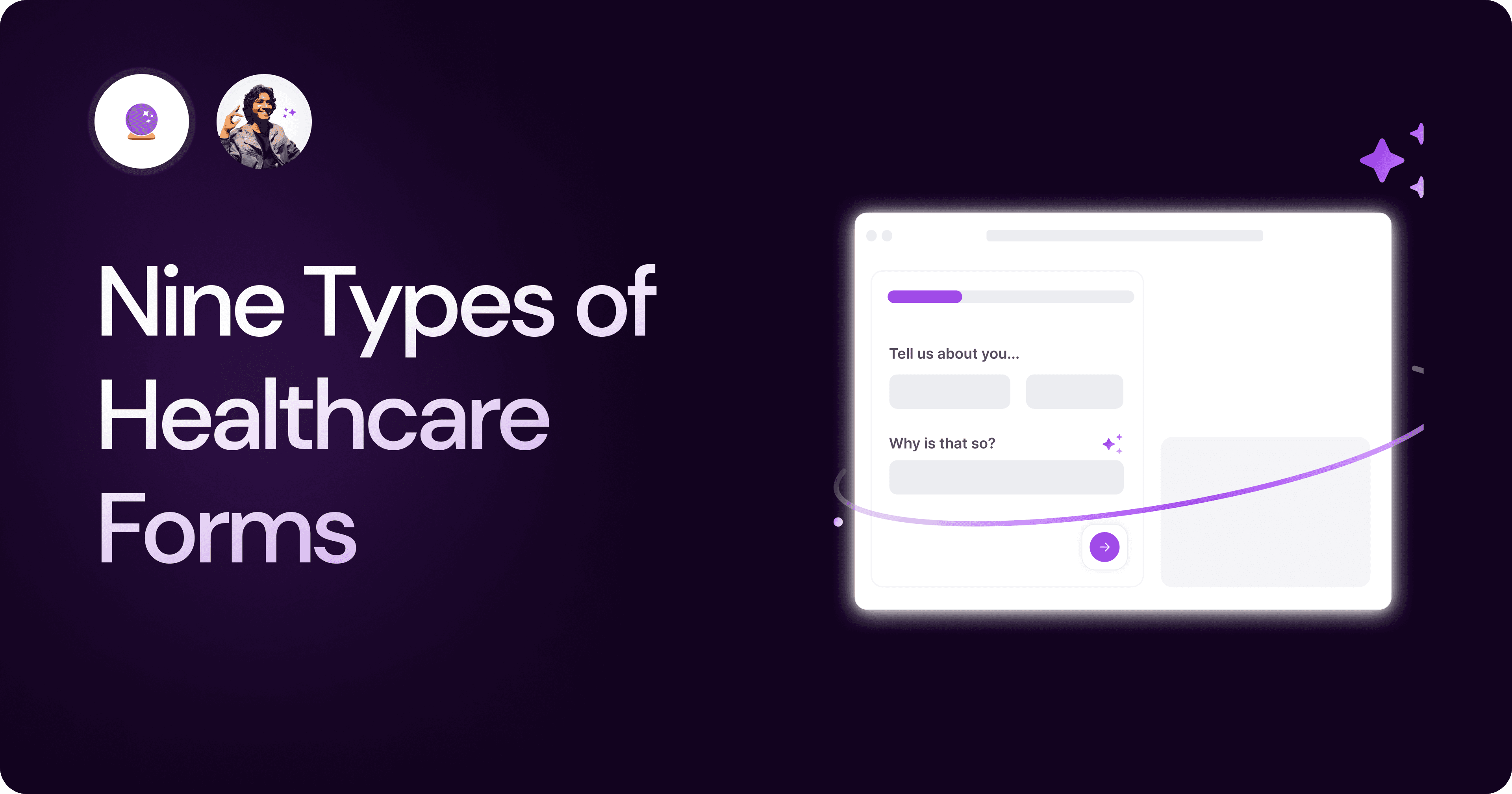
Nine Types of Healthcare and Medical Forms.
Medical forms are a must-have for any healthcare business or practitioner. Learn about the different kinds of medical and healthcare forms.
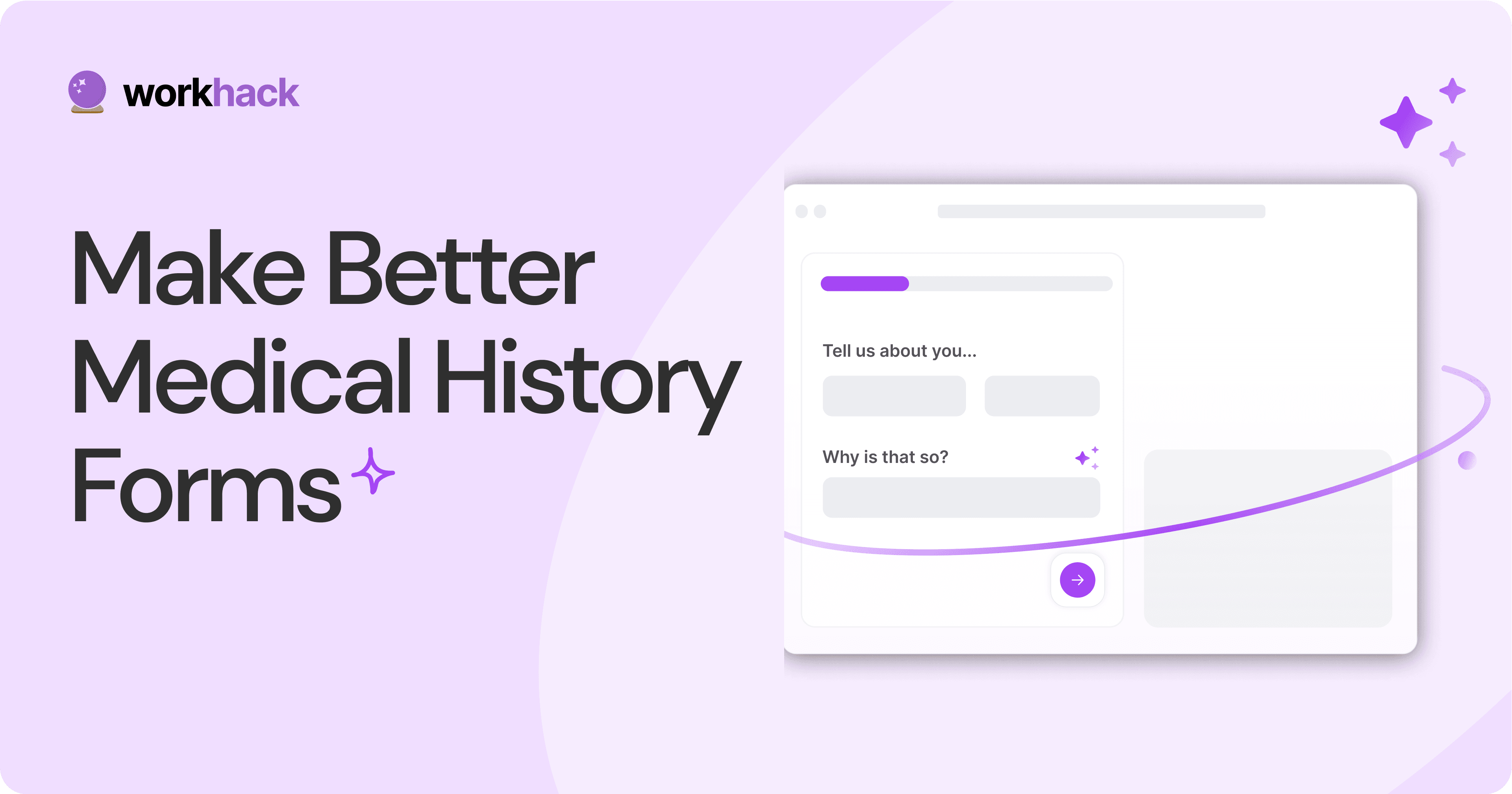
4 Tips for Better Medical History Forms.
Medical history forms are central to patient care, onboarding, and medical administration records. Learn how to make them easier to fill.
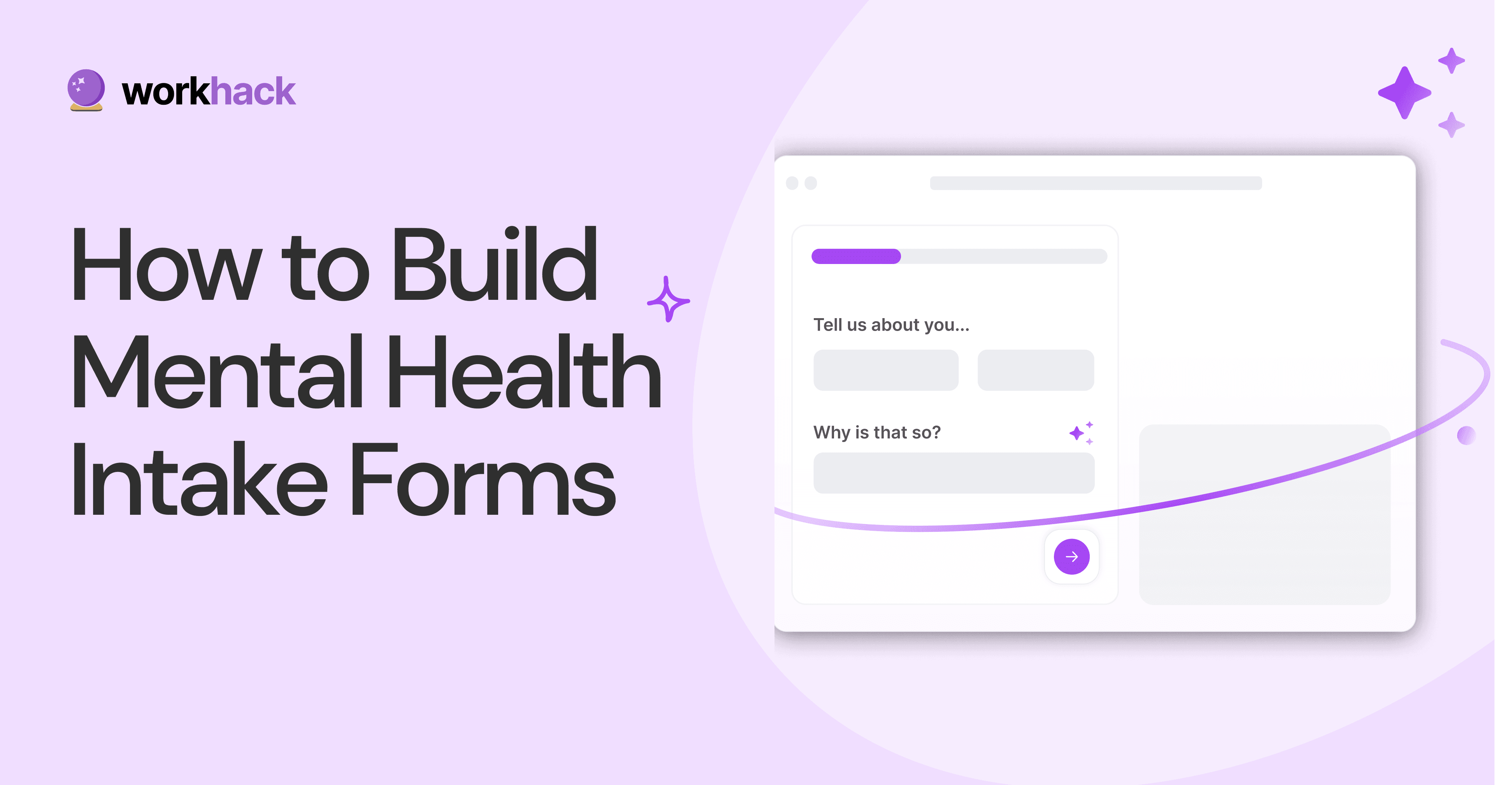
How to Build Mental Health Intake Forms?
Mental health intake forms are not like patient intake forms. Mental health intake forms deal with far more sensitive data and have specific design methods.
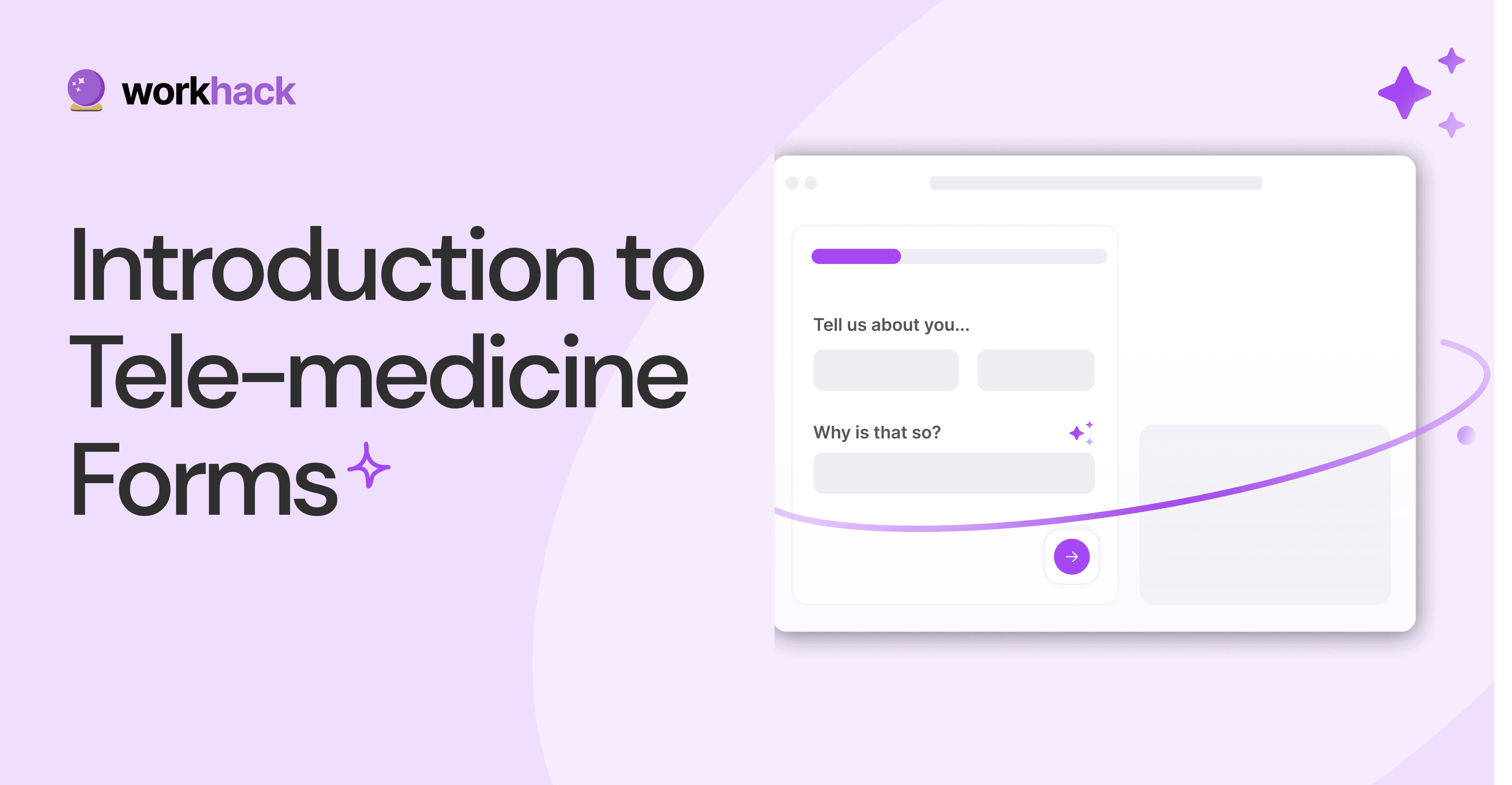
What, Why and How of Telemedicine Forms.
Telemedicine is on the rise and with different form builders out there, which one best suits your needs as a healthcare services provider?
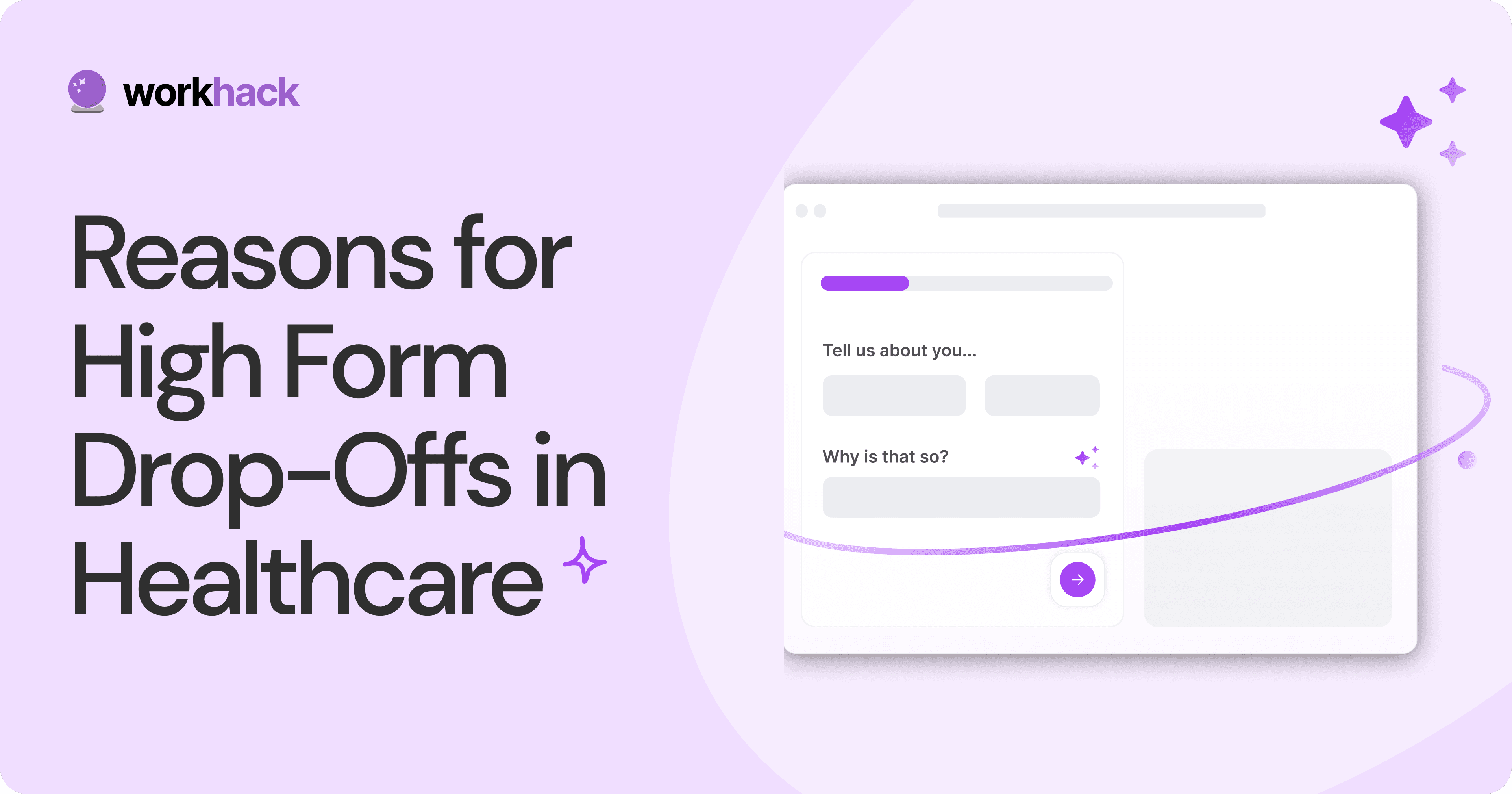
3 Reasons for Major Drop-Offs in Medical Forms.
No matter which healthcare form we pick, there are major drop-off reasons. We shall dive into the top 3 and learn how to resolve them in your next form.
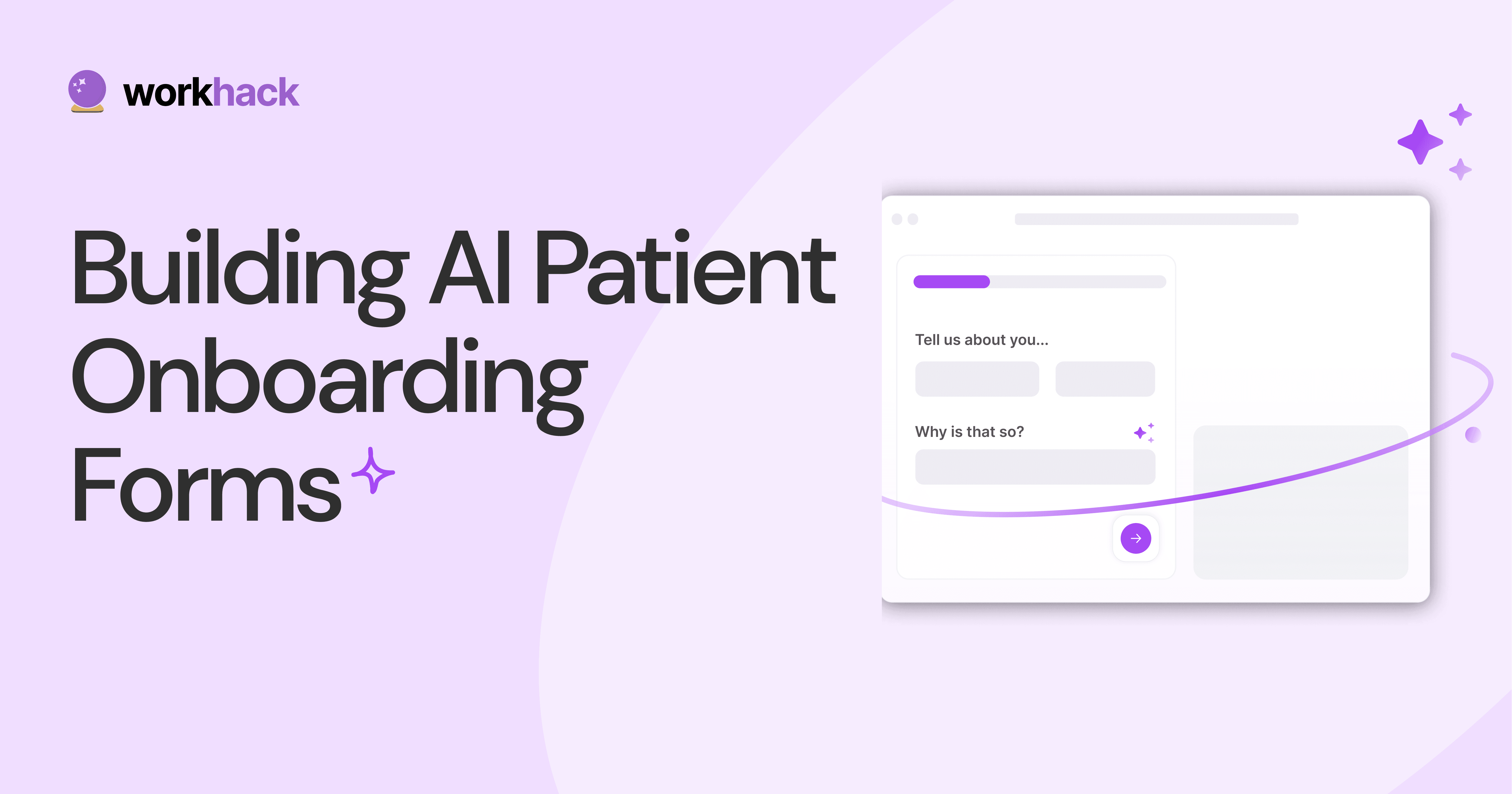
Patient Onboarding Forms - From Click to Clinic.
Patient onboarding forms are the first touchpoint for patients; getting this right for higher conversion rates is a must-have. Learn how to perfect them now.
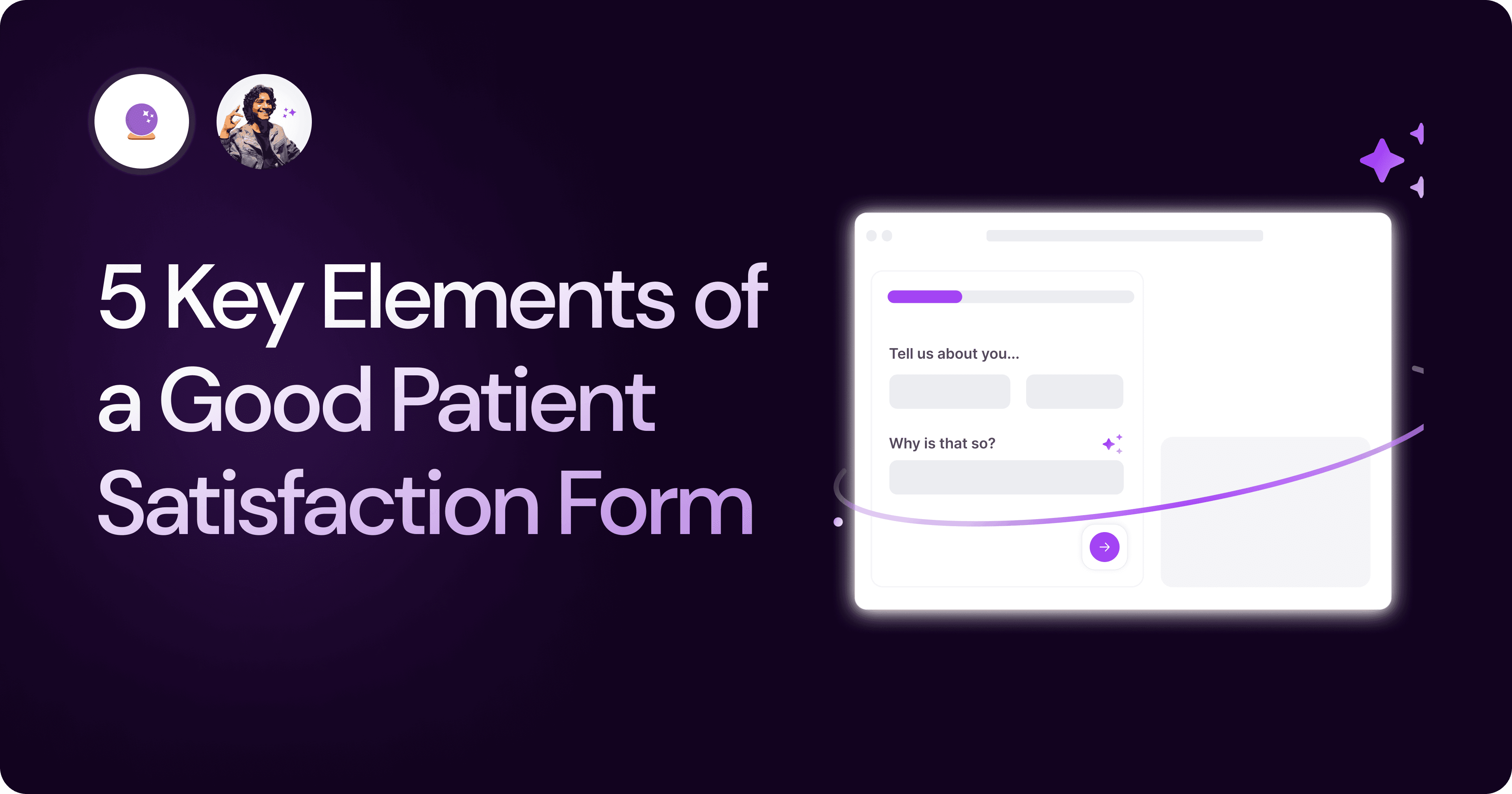
5 Key Parts of a Good Patient Satisfaction Form.
The goal of patient satisfaction surveys is to course-correct the services of a healthcare provider. Patient feedback leads to a culture of patient-centric care.
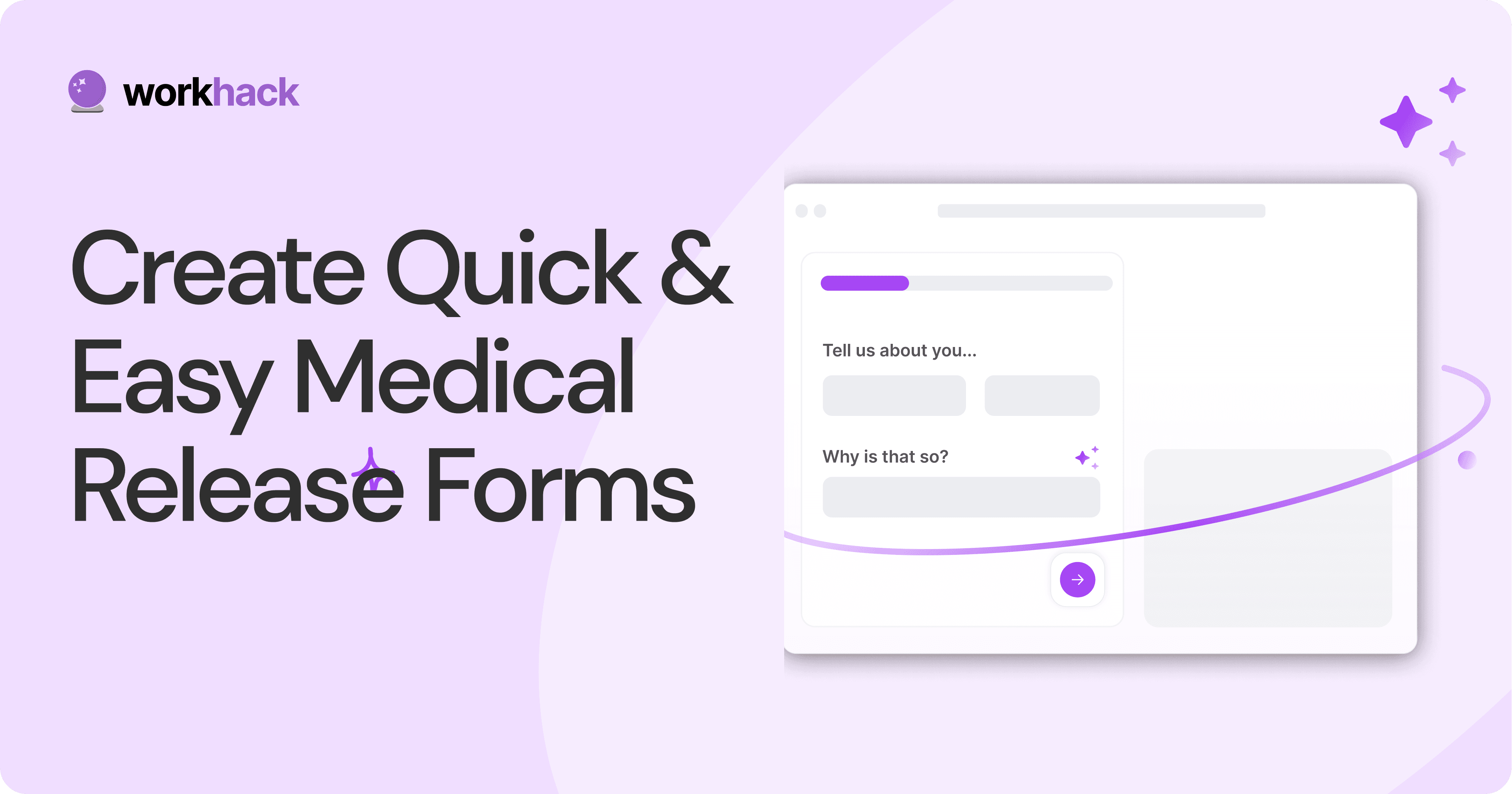
Build Quick and Easy Medical Release Forms.
Every HIPAA-compliant healthcare provider comes across medical release forms that involve details from medical history forms. Can they be shipped fast? Yes.

Nine Types of Healthcare and Medical Forms.
Medical forms are a must-have for any healthcare business or practitioner. Learn about the different kinds of medical and healthcare forms.

4 Tips for Better Medical History Forms.
Medical history forms are central to patient care, onboarding, and medical administration records. Learn how to make them easier to fill.

How to Build Mental Health Intake Forms?
Mental health intake forms are not like patient intake forms. Mental health intake forms deal with far more sensitive data and have specific design methods.

What, Why and How of Telemedicine Forms.
Telemedicine is on the rise and with different form builders out there, which one best suits your needs as a healthcare services provider?

3 Reasons for Major Drop-Offs in Medical Forms.
No matter which healthcare form we pick, there are major drop-off reasons. We shall dive into the top 3 and learn how to resolve them in your next form.

Patient Onboarding Forms - From Click to Clinic.
Patient onboarding forms are the first touchpoint for patients; getting this right for higher conversion rates is a must-have. Learn how to perfect them now.

5 Key Parts of a Good Patient Satisfaction Form.
The goal of patient satisfaction surveys is to course-correct the services of a healthcare provider. Patient feedback leads to a culture of patient-centric care.

Build Quick and Easy Medical Release Forms.
Every HIPAA-compliant healthcare provider comes across medical release forms that involve details from medical history forms. Can they be shipped fast? Yes.

Nine Types of Healthcare and Medical Forms.
Medical forms are a must-have for any healthcare business or practitioner. Learn about the different kinds of medical and healthcare forms.

4 Tips for Better Medical History Forms.
Medical history forms are central to patient care, onboarding, and medical administration records. Learn how to make them easier to fill.

How to Build Mental Health Intake Forms?
Mental health intake forms are not like patient intake forms. Mental health intake forms deal with far more sensitive data and have specific design methods.

What, Why and How of Telemedicine Forms.
Telemedicine is on the rise and with different form builders out there, which one best suits your needs as a healthcare services provider?

3 Reasons for Major Drop-Offs in Medical Forms.
No matter which healthcare form we pick, there are major drop-off reasons. We shall dive into the top 3 and learn how to resolve them in your next form.

Patient Onboarding Forms - From Click to Clinic.
Patient onboarding forms are the first touchpoint for patients; getting this right for higher conversion rates is a must-have. Learn how to perfect them now.

5 Key Parts of a Good Patient Satisfaction Form.
The goal of patient satisfaction surveys is to course-correct the services of a healthcare provider. Patient feedback leads to a culture of patient-centric care.

Build Quick and Easy Medical Release Forms.
Every HIPAA-compliant healthcare provider comes across medical release forms that involve details from medical history forms. Can they be shipped fast? Yes.

Nine Types of Healthcare and Medical Forms.
Medical forms are a must-have for any healthcare business or practitioner. Learn about the different kinds of medical and healthcare forms.

4 Tips for Better Medical History Forms.
Medical history forms are central to patient care, onboarding, and medical administration records. Learn how to make them easier to fill.

How to Build Mental Health Intake Forms?
Mental health intake forms are not like patient intake forms. Mental health intake forms deal with far more sensitive data and have specific design methods.

What, Why and How of Telemedicine Forms.
Telemedicine is on the rise and with different form builders out there, which one best suits your needs as a healthcare services provider?

3 Reasons for Major Drop-Offs in Medical Forms.
No matter which healthcare form we pick, there are major drop-off reasons. We shall dive into the top 3 and learn how to resolve them in your next form.

Patient Onboarding Forms - From Click to Clinic.
Patient onboarding forms are the first touchpoint for patients; getting this right for higher conversion rates is a must-have. Learn how to perfect them now.

5 Key Parts of a Good Patient Satisfaction Form.
The goal of patient satisfaction surveys is to course-correct the services of a healthcare provider. Patient feedback leads to a culture of patient-centric care.

Build Quick and Easy Medical Release Forms.
Every HIPAA-compliant healthcare provider comes across medical release forms that involve details from medical history forms. Can they be shipped fast? Yes.
Subscribe to stay updated.
Subscribe to stay updated.
Subscribe to stay updated.
HC

HC

HC

HC

70+ people from across industries read our emails.
HC

HC

70+ people from across industries read our emails.
HC

HC

HC

70+ people from across industries read our emails.




Bangalore, India / San Francisco, US
WorkHack Inc. 2023
Bangalore, India
San Francisco, US
WorkHack Inc. 2023
WorkHack Inc. 2023
Bangalore, India / San Francisco, US
WorkHack Inc. 2023
Bangalore, India / San Francisco, US



